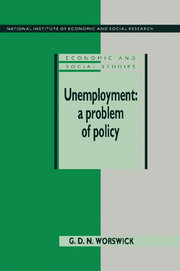Book contents
- Frontmatter
- Contents
- List of tables
- List of charts
- Preface
- 1 INTRODUCTION
- 2 CONCEPTS AND MEASUREMENTS
- PART 1 STRUCTURAL CHANGE
- PART 2 THE WAGE QUESTION
- PART 3 MACROECONOMIC POLICY
- PART 4 INTERNATIONAL DIMENSION
- 16 THEORY AND INSTITUTIONS
- 17 THE EXTERNAL CONSTRAINT
- 18 THE EUROPEAN DIMENSION
- 19 CONCLUSION
- Appendix to Chapter 8: The puzzle of the apparent fall in United States real wages
- Notes
- List of works cited
- Index
- THE NATIONAL INSTITUTE OF ECONOMIC AND SOCIAL RESEARCH PUBLICATIONS IN PRINT
17 - THE EXTERNAL CONSTRAINT
from PART 4 - INTERNATIONAL DIMENSION
Published online by Cambridge University Press: 06 July 2010
- Frontmatter
- Contents
- List of tables
- List of charts
- Preface
- 1 INTRODUCTION
- 2 CONCEPTS AND MEASUREMENTS
- PART 1 STRUCTURAL CHANGE
- PART 2 THE WAGE QUESTION
- PART 3 MACROECONOMIC POLICY
- PART 4 INTERNATIONAL DIMENSION
- 16 THEORY AND INSTITUTIONS
- 17 THE EXTERNAL CONSTRAINT
- 18 THE EUROPEAN DIMENSION
- 19 CONCLUSION
- Appendix to Chapter 8: The puzzle of the apparent fall in United States real wages
- Notes
- List of works cited
- Index
- THE NATIONAL INSTITUTE OF ECONOMIC AND SOCIAL RESEARCH PUBLICATIONS IN PRINT
Summary
The questions we explore in this chapter are whether openness – especially in trade and capital movements – prevents, or makes more difficult, the achievement of policy objectives to which there might appear to be no obstacle in a closed economy. If we conclude that there are such constraints, the next question is whether there exist measures which might mitigate or even counter their influence. In Britain, in the interwar years and for many years since, the current balance of payments has been seen as a problem, in particular leading to unemployment or blocking policies for full employment. But this is not the only possibility. Indeed, some countries, such as Germany and Japan, which have run large surpluses for long periods, might not see it so much as a constraint, but as an opportunity to maintain employment through increasing exports. But they might see in openness a possible threat to their own policy of domestic price stability. And, of course, the same country might find openness presenting different opportunities and different constraints at different times in its history. But it is British employment which is our subject and it is with that problem that we begin.
Table 17.1 shows the five-yearly average of the United Kingdom current balance from 1950/4 to 1985/9. As causes of intermittent crises in the 1950s and 1960s, these ratios seem small beer. Only in the 1980s, when the doctrine that the current account does not matter began to receive currency, do we encounter figures above 1 per cent.
- Type
- Chapter
- Information
- Unemployment: A Problem of PolicyAnalysis of British Experience and Prospects, pp. 206 - 221Publisher: Cambridge University PressPrint publication year: 1991

